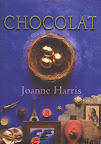 I love the movie Chocolat, and have seen it many times, so when Chasida listed it as a Something About Me book, it seemed time to finally read the book.
I love the movie Chocolat, and have seen it many times, so when Chasida listed it as a Something About Me book, it seemed time to finally read the book. I was really surprised by how different the book is from the movie. I suspect that if I had first read and love the novel, I would have been annoyed by the movie.
For those who have neither read the book nor watched the movie, a quick summary: The main character is Vianne, who is a single mother with a young daughter, Anouk. She moves into a small French town and opens a chocolate shop. She is met with resistance by a community that is steeped in a tradition of self-denial, and unfortunately the opening of her shop coincides with Lent. She finds herself at odds with the town priest and members of the community, both over differences in opinion about the evils of life's little enjoyments and over differences in opinion about accepting a nomadic group of river gypsies.
The biggest surprise in the book was, for me, that instead of a seriously straightlaced and repressed mayor and a young, more open-minded priest, there was only one character, Reynaud, who was basically the same as the mayor in the movie, only he was the priest. I read at Harris' site that those involved with the film decided to make the main antagonist a mayor instead of a priest to avoid offending Catholic people. Personally, I don't find Catholic people that easily offended, and I hate censoring art in order to avoid upsetting a powerful group, but ok. It works beautifully as a movie anyway. In the novel, the priest is a more prominent character, and is even the narrator in some chapters.
Another surprise is that I've always perceived the movie to be set in the 1950s. The Wikipedia article states that it's the winter of 1959. The book, though, seems set at the time of its publication, 1999.
Sadly, the Roux character is not Johnny Depp in the book, and he seems to belong more to Armande (as a friend) than to Vianne. But in the book, the prejudice of the town towards Roux and his friends is a stronger storyline than in the movie.
One difference I liked a lot is that the character Armande is more developed and more interesting. The movie glances lightly over the fact that Armande is diabetic, and Vianne at times seems careless with Armande's health in allowing her to indulge in chocolate. The viewer does perceive that it's not really a black and white situation; Armande is an adult and should be allowed to make her own decisions about her health. In the book, though, it's much more clear that Armande, as a woman in her 80s, does not want to spend her few remaining years restricting her diet or being treated like a child by her domineering daughter. The reader is made very aware that a woman that old is going to die fairly soon, and Armande chooses to die in her home living her life as usual, rather than in a facility being an invalid. I had respect for the book Armande's decision to enjoy the remainder of her life to the fullest, including developing a relationship with her grandson. The movie Armande just seemed stubborn and grumpy, and as a much younger woman (60?), self-destructive in her decision to behave in a way that led to her death.
The novel also focused more on Vianne's past, her relationship with her mother, and her relationship with her daughter, Anouk, all of which were rewarding storylines the movie could only glance over.
There's a sequel to the novel, The Lollipop Shoes, which I'd like to read and will add to my wishlist.

3 comments:
your review makes me want to re-read this book. and thanks for letting us know about the companion novel. :)
i just got the DVD from the library, so i think i'll watch the movie - and then i'll read the book later. thanks for the review!
I will definitely be looking out for the sequel. I really enjoyed reading this for the challenge as well.
Post a Comment